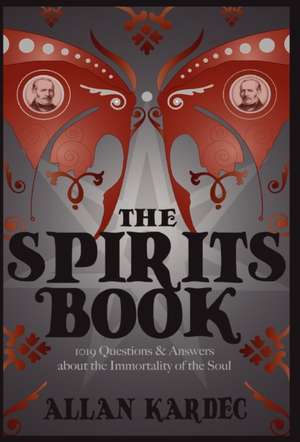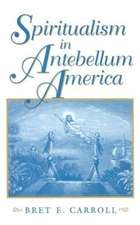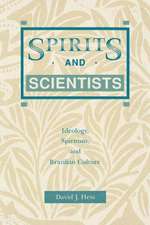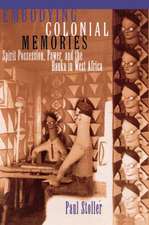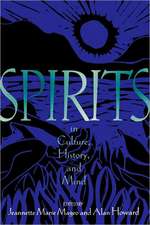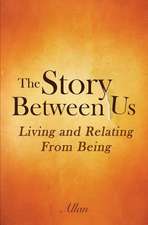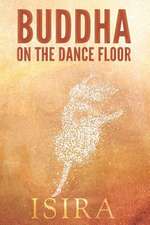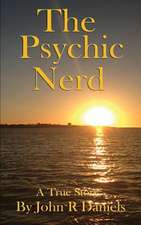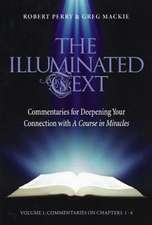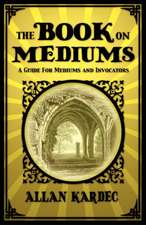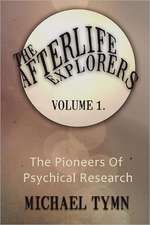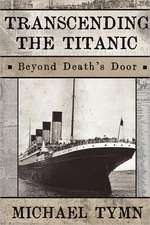The Spirits Book
Autor Allan Kardecen Limba Engleză Hardback – 30 apr 2010
| Toate formatele și edițiile | Preț | Express |
|---|---|---|
| Paperback (1) | 167.64 lei 3-5 săpt. | |
| White Crow Books – 30 apr 2010 | 167.64 lei 3-5 săpt. | |
| Hardback (1) | 261.36 lei 3-5 săpt. | |
| White Crow Books – 30 apr 2010 | 261.36 lei 3-5 săpt. |
Preț: 261.36 lei
Nou
Puncte Express: 392
Preț estimativ în valută:
50.01€ • 52.36$ • 41.38£
50.01€ • 52.36$ • 41.38£
Carte disponibilă
Livrare economică 15-29 martie
Preluare comenzi: 021 569.72.76
Specificații
ISBN-13: 9781907661310
ISBN-10: 190766131X
Pagini: 548
Dimensiuni: 140 x 216 x 35 mm
Greutate: 0.83 kg
Editura: White Crow Books
ISBN-10: 190766131X
Pagini: 548
Dimensiuni: 140 x 216 x 35 mm
Greutate: 0.83 kg
Editura: White Crow Books
Notă biografică
The figure-head of the Spiritist movement, Allan Kardec, was born Hippolyte Leon Denizard Rivail on October 3rd, 1804, in Lyon, France. He came from a long line of lawyers and legal professionals and was expected to follow suit but broke with family tradition to explore his interests in philosophy and the sciences. Hippolyte finished his studies in Switzerland where he became an acolyte and colleague of the famed educational maverick Johann Heinrich Pestalozzi. By the time he had finished his education Rivail had quite a collection of qualifications and skills such as Bachelor of the Arts degrees in science and letters and a doctorate in medicine. He was also fluent in Spanish, German, Italian and English and all of the talents and honours he had acquired made him an ideal collaborator for Pestalozzi. Hippolyte's work with Pestalozzi helped to lay the foundations for the teaching model in schools in France and Germany. He was a member of many scientific societies and wrote extensively on various subjects and one of his papers, 'Which System of Study Is Most Harmonious with the Needs of the Time?', lead to his induction in the Royal Academy of Arras. Rivail's interests in science expanded beyond conventional studies and by the early 1850's he had taken an interest in Franz Mesmer's theory of 'animal magnetism'. Mesmer's theory was all the rage in the upper reaches of society and so was the phenomenon of 'spirit tapping'. Spirit tapping had become very popular in France and the USA and it involved the apparent unaided movement of objects by spirit forces to answer questions by tapping out noises on surfaces with the amount of knocks translating to numbers of the alphabet. Such widespread fascination in the incidents piqued the interest of Rivail and so he decided to investigate the strange goings on. He attended his first seance in the May of 1855 and recorded his thoughts on this initial exposure to the phenomenon: These meetings provided me with my first opportunity for serious studies of the subject that later led to the Spiritist Doctrine-study filled less with revelation and more with systematic observation. As to any new subject, I applied rigorous method to the investigation: avoiding preconceived notions, I observed attentively, compared observations, and deduced the consequences. I tried to identify the causes of the phenomena by linking the facts logically, and I did not accept an explanation as valid unless it could resolve all the difficulties of the question. This was the way I had always, from the age of fifteen or sixteen, proceeded in my scientific investigations. I understood from the beginning the gravity of the exploration I was undertaking. I foresaw in those phenomena, the key to the solution of problems so obscure and so disputed, both in the past and in the future, which I had searched for all my life; the phenomena posed a complete revolution in ideas and beliefs. It was necessary, therefore, to act not lightly, but rather with circumspection, to be positive rather than idealistic, so as not to be carried away by illusions.A" During the many seances he attended Kardec communicated with a collection of entities that called themselves 'The Spirit of Truth'. The group talked about many lofty subjects such as life after death, good and evil, the universe and the origin of spirits, amongst others. Thomas of Aquino, Voltaire and Augustine of Hippo all came through in the sessions and after a number of seances with the group Revail decided there was enough proof to convince him that there was life after death. Sensing that his revelation wasn't meant just for him he decided to spread the message and 'codified' the Spirit of Truth's teachings and listed them as answers to questions. The resulting text made up his first book on the topic, 'The Spirits Book', and the book was published under the pseudonym of Allan Kardec. Sources vary on why he chose the name with some suggesting it was an old Breton name from his mother's family with others postulating that in his seances with the group he had been communicating with an entity named Zefiro who told him that in a former life he had been a Druid named Allan Kardec. Whatever the genesis of the soubriquet the reason he decided to use this as his pen name is not so disputed: he simply wanted to distinguish his Spiritist writing from his formal educational texts. 'The Spirits Book' was the first of five texts he wrote, collectively known as the 'Spiritist Codification', that laid out the Spiritist doctrine with the other four books, 'The Medium's Book', 'The Gospel According to Spiritism', 'Heaven and Hell' and 'The Genesis According to Spiritism', making up the number. 'The Spirits Book' was released 1857 and it didn't take long for Spiritism to become popular and spread far beyond France. People in many other European countries followed Kardec's lead and Spiritism found its way to North America where it travelled south to Brazil where Kardec's doctrine still has millions of followers to this very day. Many of Kardec's contemporaries, such as famed French astronomer Camille Flammarion, expressed their belief in Spritism and it was Flammarion who read the eulogy at Kardec's funeral after he died from an aneurysm in 1869. To this day his grave is one of the most visited in Paris with his legions of followers, many from Brazil, flocking there each year to leave messages and flowers. After his death his work and message was continued and expanded upon by Leon Denis who had been converted to Spiritism after reading 'The Spirits Book' of which he said the following; I found in this book the clear solution, complete and logical, to a universal problem. My conviction became strong and sound. The Spiritist Theory dissipated my indifference and my doubts.A" Allan Kardec is the pseudonym name of the French scientist and educator Hippolyte Leon Denizard Rivail (October 3, 1804 - March 31, 1869). He is known today as one of the founders of Spiritism and the author of five books dedicated to the Spiritist Codification
